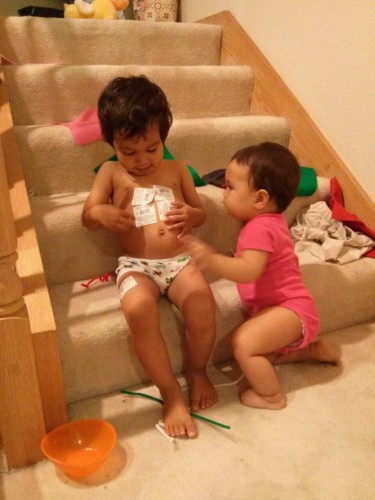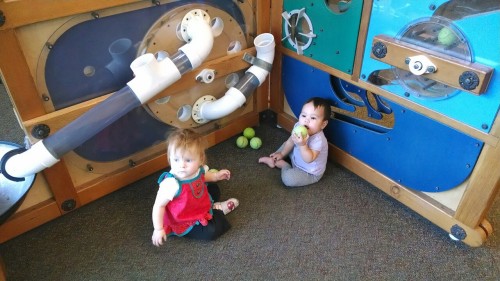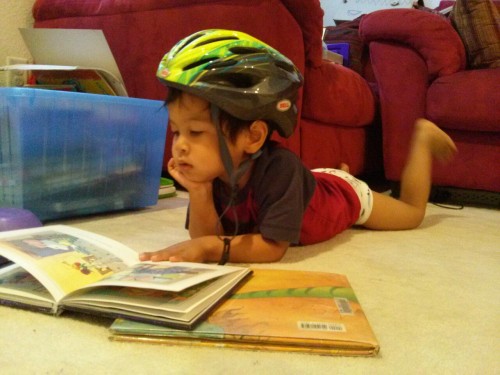Dear Js,
Don’t tell her I told you this. Mama felt down all this week. A few weeks ago, she was excited to work on her biz. Things were popping. Newsletter, moms, group, workshop, pediatrician. So many things. This week, everything seemed to fall apart.
For starters, something weird started happening to the baby boutique owner. She just stopped replying to mama’s emails and stopped chatting with mama when she was in the store every Monday as she normally did.
It was strange because she was excited about every step of the newsletter for weeks up til now. Suddenly cold and silent. Something must’ve happened. What do you think it could be? I think whatever derailed her original newsletter has surfaced again here. Some back-story: she had published a newsletter for 20+ years before we came along, and one day she just stopped. After she chatted with us, she was excited to resume it, so it was uncharacteristic to cut contact out of nowhere.
Anyway, mama also feels overwhelmed. With you two, and maybe with me too. She was recommended this book titled “Overwhelmed: Work Love and Play when No One Has Time“.
Put it all together and that’s why this latest bump discouraged her. First the excitement and hope… and then… crash burn dreams ashes.
We talked a little. I focused on the part that I knew a little about — trying and failing. I wanted to share with you what I shared with her. And that is this: it’s okay to feel shitty.
In fact, success happens to people who aren’t afraid of feeling shitty. And those who can stomach feeling shitty more than ordinary people.
Otto was known as the “Father of Flight.” He gave his life to science and aviation. These are the highlights of his life:
- 1889 – Otto publishes in his book Der Vogelflug als Grundlage der Fliegekunst (Bird Flight as the Basis for the Art of Aviation) measurements on wings, so called polar diagrams, which are the concept of description of artificial wings even today. The book gives a reference for the advantages of the arched wing.
- 1891 – Otto flies about 25 m (82 ft) in his Derwitzer Glider.
- 1892 – Otto Lilienthal flies over 82 metres (90 yards) in his Südende-Glider.
- 1893 – Otto Lilienthal flies about 250 m (820 ft) in his Maihöhe-Rhinow-Glider.
- 1894 – Otto Lilienthal’s Normal soaring apparatus is the first serial production of a glider. Using different aircraft constructions he covers distances of up to 250 metres (820 ft).
- 1896 – Otto Lilienthal crashes after a stall caused by a gust, breaking his back. He dies the following day.
What do you see? His successful flights. And his death. Only glory and tragedy. It’s never about the Struggle. That’s why schools cramming history into children is bullshit. When you compress time, you leave out the most important lessons.
And if reporters then were as bad as they are today, I bet they only flocked whenever he had a successful machine. Not the 500 times he crashed before that. Not when he was tinkering obsessively in his workshop late into every night. Not when he and his brother Gustav first strapped wings to their arms decades earlier.
That’s why people learn nothing about being successful from the media. There’s no profit for the media in showing the dirty, messy, boring… work.
And that’s why the secret to success remains a secret hidden in plain sight. The “secret” road is paved with shit and shitty feelings. The odd 1%-15% who succeed are the ones who can endure. Dig into any successful person’s history and you’ll find a theme of persistence — through failures that would have crushed ordinary people to tears.
That’s also why the people at the top 1% usually have some sort of dysfunction. Normal people go, “Eh, that’s okay. It’s okay if I didn’t win. I didn’t want it that bad.” Whereas most successful people fear failure more than they want success. They have a disease. Something eating at his soul.
Joe Girard, the “World’s Greatest Salesman”, sold more retail “big ticket” items “one-at-a-time” than any other sales person in any retail industry including houses, boats motor homes, insurance, automobiles, etc. The average car salesperson averages seven cars a month. He averaged six new retail automobile sales a day. New cars, not used. Six. Average. ONE AT A TIME. At his peak, he sold 18 cars a day, 174 cars a month and 1425 cars a year. What demons could drive a man like this? Listen and see if you can spot it:
“Salespeople are not born. They are made… I stuttered as a kid because of the things my dad would say to me. He took away my confidence and I stuttered until the age of 35. I went to see a psychologist. Now I’m the type of person when something is wrong, I don’t wait until it gets worse. I handle it yesterday. I stopped stuttering and I wanted to get into the sales game…”
“30 years ago, when I was growing up in Detroit, Michigan, I had a father… I don’t know why he didn’t like me. Used to beat me and hit me and tell me that I was no good and that I was a no good bum. And had I not had a beautiful mother at the time, who would sell me and tell me, “Don’t listen to him. Show him that you can be good. One day she took me to a window and she said, “Joey, out there there’s something for everybody. Go out and find it. And show him. That he’s wrong.”
“… It’s to prove to my father that he was wrong. To show him that I’m gonna be the best at anything. I used to build homes for 13 years. And doing quite well. And not once did my father ever say, “I’m proud of you.” He never said it to me. 1963 at age 35, I lost a three million dollar building business. And when I did he said I told you you’re nothing but a bum. I lost my home. I lost everything. I got a job selling cars just to bring home a bag of groceries for my wife and two kids. And because I started putting good thoughts into my head, 3 years later at age 38, in 1966, they named me the number one salesman in the world. Because I believed from anything negative, there’s something positive. My father was negative and I turned it around. And I said I’m gonna show him.”
It’s a shame that the media has a love affair with miracles. “Look at this child prodigy.” “Look at that gifted kid.” “Mother turns child’s Lego creation into a million-dollar product.” They ask in interviews, “If there was ONE advice you can give to people” or “What is the single biggest turning point in your life?”
As if there was one secret key that you just have to turn — if only you can find it — and the heavens will open and shower you with untold riches.
Lies. This corrupts the minds of young children who see a world where the successful are lucky or where success is a miracle. They see these stories because these stories sell.
There’s no magic. The only secret is Persistence. Keep trying. Because the only reason successful people appear to have a Golden Touch is because they try more. Try more and you’ll fail more. And you will also win more:
Dan Ariely:
Clutch players are paid much more than other players, and are presumed to perform especially brilliantly during the last few minutes or seconds of a game, when stress and pressure are highest.
With the help of Duke University men’s basketball Coach Mike Krzyzewski (“Coach K”), we got a group of professional coaches to identify clutch players in the NBA (the coaches agreed, to a large extent, about who is and who is not a clutch player). Next, we watched videos of the twenty most crucial games for each clutch player in an entire NBA season (by most crucial, we meant that the score difference at the end of the game did not exceed three points). For each of those games, we measured how many points the clutch players had shot in the last five minutes of the first half of each game, when pressure was relatively low. Then we compared that number to the number of points scored during the last five minutes of the game, when the outcome was hanging by a thread and stress was at its peak. We also noted the same measures for all the other “nonclutch” players who were playing in the same games.
We found that the non-clutch players scored more or less the same in the low-stress and high-stress moments, whereas there was actually a substantial improvement for clutch players during the last five minutes of the games. So far it looked good for the clutch players and, by analogy, the bankers, as it seemed that some highly qualified people could, in fact, perform better under pressure.
But — and I’m sure you expected a “but” — there are two ways to gain more points in the last five minutes of the game. An NBA clutch player can either improve his percentage success (which would indicate a sharpening of performance) or shoot more often with the same percentage (which suggests no improvement in skill but rather a change in the number of attempts). So we looked separately at whether the clutch players actually shot better or just more often. As it turned out, the clutch players did not improve their skill; they just tried many more times. Their field goal percentage did not increase in the last five minutes (meaning that their shots were no more accurate); neither was it the case that non- clutch players got worse.
At this point you probably think that clutch players are guarded more heavily during the end of the game and this is why they don’t show the expected increase in performance. To see if this were indeed the case, we counted how many times they were fouled and also looked at their free throws. We found the same pattern: the heavily guarded clutch players were fouled more and got to shoot from the free-throw line more frequently, but their scoring percentage was unchanged. Certainly, clutch players are very good players, but our analysis showed that, contrary to common belief, their performance doesn’t improve in the last, most important part of the game.
A good way to think about it is:
Failure is a gift that tells you you’re going the right way
Because if you succeed easily, you obviously weren’t doing something hard. Worse yet, it was so easy you didn’t learn anything. On the other hand, when you take on the world’s most important problems, and when you set out to add the most value to other people’s lives, you will definitely fail. Not just once, but many times. Cherish the fact that failure is the rite of passage that everyone who sets out to do anything worth doing must endure.
By the way, the name for the problem with media is called: Media Bias.
Of all the sins the media commits, two are the most destructive to a learning mind, and the growth of our society:
1) Sensationalism — a bias in favor of the exceptional over the ordinary, giving the impression that rare events, such as airplane crashes, are more common than common events, such as automobile crashes. The media loves to crowbar stories to highlight “miracles”, “unlikely success”, “right place right time”, “chance encounters”, “supernatural gifts”, etc. Basically, a summary that looks like Joseph Campbell’s Monomyth.
But one that undermines all earned success is: 2) Concision bias — a tendency to report views that can be summarized succinctly, crowding out more unconventional views that take time to explain. Why? Because the road to success or mastery is always long. Too long to be covered in an article, an interview, a documentary, a 3-hour movie or even a book. Couple that with the fact that many successful people only achieve significant success later in their lives (Colonel Sanders & KFC: age 65, Henry Ford & Model T: age 45, Bill Lear & Lear Jet: age 61, Soichiro Honda & Honda: age 47).
This is also described as the “Narrative Fallacy”:
“The narrative fallacy addresses our limited ability to look at sequences of facts without weaving an explanation into them, or, equivalently, forcing a logical link, an arrow of relationship upon them. Explanations bind facts together. They make them all the more easily remembered; they help them make more sense. Where this propensity can go wrong is when it increases our impression of understanding.”
—Nassim Nicholas Taleb, The Black Swan
How can you pack over years of failures and lessons into one sitting? You can’t. That’s why the media summarizes. It hacks down a hero’s entire life into nonsensical bullets with a start/pivotal-moment/end. Or they find “lottery winner” stories that are simple (because luck/magic). They are designed to be consumed by the zombie masses with a 3-second attention span while they check their phones and cross the street.
In today’s distracted ADD world, the stories they tell are getting even worse. Media bias comes from journalists telling stories in a way that people read them. You won’t get the truth. Because most of the time, reality is boring.
For instance, last week, a Malaysian Airlines plane MH370 went missing. How does a Boeing 777 go missing? No one knows yet. But it’s been a media circus of everyone wanting to say something to suck eyeballs to their publication… while not adding any facts. The readers want an answer — a conclusion to the drama. So what do they do when there is no answer? Speculate. Interview anyone willing to offer an “answer”. They even went as far as to invite pathological conman psychic Uri Geller to use “remote-viewing” to find the plane.
My favorite response to all this was from a military guy who had a career searching for downed or lost aircraft, “This isn’t CSI or an episode of 24, sometimes you don’t get answers in 60 minutes with time out for piss breaks and a snack. Deal with it.”
One thing I’d like to do someday is produce an entertaining/educational series that features successful regular Joes and Janes who earned their success. I want to take time to probe where no one else cares to ask. Instead of digging for miracles or serendipitous acts of God, I will highlight failures. I will mine for lessons that come from painful failures.
Joe Girard likes to say, “If it’s to be, it’s up to me.”
Because understand that when you wait for an act of God, You really are waiting on You. God is you. And you are God.
From Dan Ariely:
A 2009 study by Nick Epley and some of his colleagues from the University of Chicago asked religious Americans to state their positions on abortion, the death punishment and the war in Iraq. (This study is described in Dr. Epley’s recent book, “Mindwise: How We Understand What Others Think, Believe, Feel, and Want.”) Participants were then asked to predict the opinions of a few well-known individuals (such as Bill Gates), President Bush, the “average American,” and—and uniquely to this study—God on these issues.
Interestingly, the respondents were rather objective about predicting the opinions held by their fellow humans, but they tended to believe that God had similar opinions to their own. Conservatives believed God was very conservative; liberal believers were certain that God was more lenient.
To find out why we can view God so flexibly, a follow-up experiment asked another group of participants to take the position on the death penalty diametrically opposed to their own and argue this viewpoint in front of a camera. A large body of research on cognitive dissonance has shown that people who are forced to argue for an opinion opposite to their actual one feel so uncomfortable with the conflict that they’re likely to change their original opinion. After giving their on-camera speech, participants were again asked to express the views on these hot-button issues of the study’s famous individuals, President Bush, the “average American” and God.
The results? After expressing the opinion opposite their original one, individuals became more moderate. Those who disliked the death penalty became less opposed, and those who were for it became less so. But there was no such shift in participants’ predictions of the opinions of the well-known individuals, President Bush or the “average American.” And what about their predictions about God’s views? Participants tended to attribute the same position as their own new, more moderate viewpoint to God.
God, apparently, is something of a clean slate on which we can more easily project whatever we wish. We subscribe to the religious group that supports our beliefs, and then interpret Scripture in a way that supports our opinions. So if there is a God, I believe—no, I’m sure—that that (s)he thinks the way I do.
In case you didn’t read that, here’s a video summary:
Enough about that. On to the usual updates…
New developments:
Jules your beaver teeth are sharp. You’re still nursing so ouch mama. It’s bad enough when you chomp me as I try to finger-brush your teeth.
We’ve moved your car seats next to each other. Used to be two window seats. Now J stays window and J2 in the middle. One reason we did it is so that mama can sit with you. J2 you don’t like driving in the dark. The other reason is we’re getting ready for grandma/grandpa’s visit. This way we can fit mama, grandmapas and you two while I’m at work.

The other day your brother helped split blueberries for you by biting them in half. He enjoyed helping and loved watching you make them disappear so he went too fast. Good thing mama stopped him because you ate everything he gave you.
You’re much better at helping me get you dressed. You let me lay you on your back (you used to cry when you noticed I wasn’t mama). You let me put a shirt over your head. And you help thread your arms through the sleeves. I go “where are your fingers” and you look worried. Then you push them out and “there they are” you smile and wiggle them. Just a few weeks ago it was like trying to paint a cat with butter.
Speech development. Your favorite word is “Bow”. Mama thought it was J when you woke up saying, “I like BOW.” But that was a one-off. Weird things like that happen when you two wake up from your naps. More often, it’s “Boh boh” or “Ah bo” or “Elbow” or “yeh yeh yeh yeh” “Bow.”
Sometimes I like to blow the hair tufts on your head. You blow back at my nose. Sometimes you whistle.
This week in pictures:
Going with the theme of Celebrating Failure… You might have noticed by now. The videos I like to make are ones that capture you two at the brink of overcoming a challenge. Something that marks a developmental milestone, and something you might have been struggling at for weeks.
Something as simple as balancing a ball on the water fountain:
(last few times you tried it, you were put off by getting splashed in your face)
Julie finally climbing up stairs:
After failing:
And trying:
and failing:
Aren’t failures more entertaining? I think so.
Mama left me with you two again to help a mama. As afraid as I am being alone with you two, we always end up having fun. This time, I caught your stair-climbing shenanigans above. And you ate fruits.
I’m not sure why but these few hours we get alone are interesting. I always feel like something changes. You two become a little different with me like we understand each other better, and I feel closer to you.

You have been wanting to climb trees every single day since he read the Little Bear book where bear climbs to the top and sees everything, then comes down when mama calls for lunchtime. Can you find Kimi? When you came home, you took off all your clothes and ran around on all fours. Naked.

We climbed more trees at the park. You climbed up every branch by yourself. Like a monkey. Was fun to watch. The other parents at the park gave us dirty looks while their children pointed and shouted. I was only there to keep you from falling. At one point you forgot to hold on to the branches. As you can see my back is much better. But it still hurts when I try to turn.
Heard at bath time by mama: “Mamaaaaaaaaaaaaaaa, Julie is stepping on my penisssssssss!!!”
It was hard to contain my laughter and explain that Julia is just a baby and doesn’t know where she is stepping and I think at some point I said: “Maybe next time you need to make sure your penis is somewhere where Julia cannot step on it”.

“I want to give a pear to miss Rachel because miss Rachel likes pears.” She watches your class at naptime. We found out that you have not been napping because you wake up to chat with her.

“After a ridiculous meltdown at the park about but wanting to wear shoes to walk to the car….he was asking me to open the window so he could get out of the car while i was driving… it was intense, and julie somehow slept through it ?.?”
Choo choo
Spinning:
This is what you did with your Scooter after watching older kids:
T-Rex kite:
We were on the way to the library. I rescued mama from you for a few hours. On the way to the library I saw a skate park. I asked you if you wanted to check it out. You said yes:
“Short circuit words” stops tantrums. They say 2’s is the troublesome age and 3’s is the whiney age. What I found to work is something that I used when you were 1 too. Remember how you were just starting to learn to talk? You would get frustrated when you couldn’t say what was on your mind. Feelings blew up inside and you’d give up and scream and cry. It was impossible to defuse that bomb directly. The thing that worked best was to acknowledge it, then redirect to something else. When you were little, I used the few words in your vocabulary that gave you happy thoughts: Car, truck, train, etc. They were like little firecrackers that stopped your screaming. These days I ask you to remember about something you enjoyed. Like a story, or dinosaurs.
We’ve had to explain dinosaurs to you. “I’m dead because I cannot see no dinosaur.” No, you are not dead. Dinosaurs are extinct, maybe because of an asteroid. A rock made a big hole. “Why were there no giraffes?” They weren’t born yet. “When the dinosaurs fall in the hole they will hurt their bodies. So they have to walk around the hole. I would like to do a dinosaur dig.” Then later, “Tell me more about the rock and the dinosaurs.”
You also learned about sensors. You’re pretty good about going potty now, with a setback because of that time mama took you to a public restroom. It flushed while you were on it. Now you scream and cry when you have to go potty, and we have to reassure you that this one is not going to flush by itself. I tried to kill the phobia by showing you how sensors work. The black thing there. See? If you wave at it it flushes. You learned about the different sensors. This one turns on the water at the sink. The sensor in your potty at home makes music. You ran out the restroom and said to mama, “I learned about sensors!”
Oh by the way, mama figured out today why the boutique owner had been avoiding her. Someone had been shoplifting from her store for months. They eventually realized that things always went missing whenever one lady came in. So when she came back again, they called the cops. The cops caught her stealing again. I’m sure the owner is heartbroken. Being so giving. But at least it’s an open-shut case. That’s the reality though. Something that gave my parents much grief in their business. They had an accountant who became a family friend, who stole from them for years. The money is money, but the torture is having your heart stabbed repeatedly over a drawn out legal battle. Another time, my dad (your grandpa) had been grooming his oldest employees to take over the biz when he retired. Then he found out that they had been stealing from him. They stole tools, scrap aluminium, nuts, bolts. He was going to hand over everything to them, but instead they were fired. I don’t even know if he pressed charges. Because again, it’s not about the money. The thing that gets you is being stabbed in the heart.
The clocks have sprang forward. There’s more light in the evenings. We’ve been enjoying our walks again.
OH OH OH I almost forgot. It’s your birthday this weekend. 3 years old. We bought you a balance bike. (That’s why you have a helmet in one of the pictures above.) We’re having it at the park near our house. 12 families are coming and a total of 50 people. I told mama I didn’t know I had so many friends and she said they’re not yours, they’re Joshua’s. The theme is DINOSAUR. Mama’s assignment for me is to make another dinosaur head and not forget it’s on Sunday.
Love,
Dad
P.S. – Failing often puts you in the company of legends like Otto Lilienthal. But I hope that in whatever you pursue, you are more disciplined in managing your risks. Especially if your life or the life of others are at risk. Be patient.
P.P.S. – After Otto Lilienthal broke his back in the crash, he was “rushed” by cargo train to Berlin, which took a day. He died at the surgeon’s clinic a few hours later. His last words to his brother Gustav were “Opfer müssen gebracht werden!” (Sacrifices must be made!).












Add your comment: